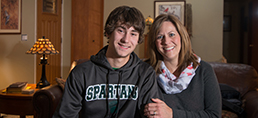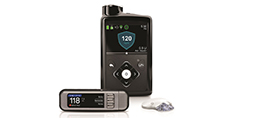
That’s how Nicole Etrheim reacted four years ago, when she learned she had Type 1 diabetes.
Now 23, Etrheim had been a careful eater who exercised regularly and considered herself quite healthy. But while attending college in Grand Rapids, she found herself getting sleepy after eating.
When her vision changed noticeably, too, she saw an eye doctor who, upon hearing of several other symptoms, including strong thirst, suggested a possible connection with diabetes.
A blood test by the college nurse showed Etrheim’s blood sugar level was extremely high. Next stop: the Spectrum Health Butterworth Hospital emergency room.
“I’ll never forget this,” Etrheim recalls. After her diagnosis, the Butterworth medical staff told her they’d need to give her an insulin shot in her stomach.
“I said, ‘You’ve got to be kidding.’ I’ve been terrified of needles my entire life. They make me nervous.”
The source of her condition is “quite a mystery,” Etrheim says, because no one in her immediate family has Type 1 diabetes.
At first, the diagnosis was “overwhelming,” she recalls. “It was really difficult.”
But she soon faced her situation and sat down with Spectrum Health’s endocrinology staff.
“Spectrum worked with me a lot,” Etrheim says. “They didn’t put me in a cookie cutter.”
Counseling from Spectrum Health’s endocrinology department was especially helpful.
“I always had more questions each time I went in,” she said. “That enabled me to pick up on issues more quickly.”
Reading clinical studies and books about living with diabetes helped Etrheim come to terms with her condition, she adds. Others may do better by talking through their situation, perhaps even going through a grieving process. The adjustment is an individualized process.
The adjustment may have been easier for Etrheim because she considers herself a detail-oriented person who is very disciplined about monitoring and adjusting her insulin pump.
“I was constantly thinking through everything,” she says.
If she wants to go for a run, what should she bring with? Going out to eat–can she check the restaurant menu online to look for carb levels?
Etrheim likes to travel, so even going through airport security requires extra preparation because of the equipment she brings.
There’s “a lot of thinking about the components of a decision,” she adds. “But it does become easier because there’s a lot more information available. You get better and better. Everything becomes more natural.”
That discipline is paying off. Etrheim’s A1C level, a measurement of glucose in her blood’s hemoglobin, has regularly been within the recommended guidelines for people with diabetes.
Her advice to those who have been recently diagnosed?
“Reach out,” she says. “There are a lot of resources you might not know about. Getting connected to other people has been invaluable.”
In addition to help from Spectrum Health’s professional staff, Etrheim says she has found mentors through the Juvenile Diabetes Research Foundation.
“Every state has one or two chapters,” she notes, including, for example, in Kentwood, a Grand Rapids suburb, which has a mentoring program that links those recently diagnosed with those who’ve had the condition for a long time.
With a recent move to Wisconsin for work and to be closer to her family, Etrheim has continued her networking.
And how’s that aversion to needles?
“I still hate them,” she says. “I’ll never enjoy needles, and I don’t think anyone does.” But now, “I can prick my finger (for a glucose level test) and not even think about it.”
 /a>
/a>
 /a>
/a>
 /a>
/a>